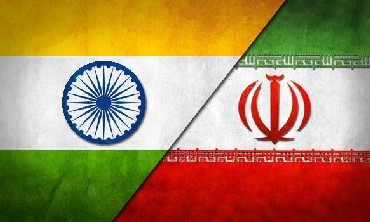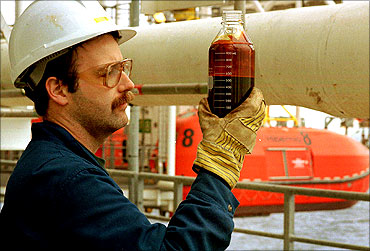The recent arrangement reached by India and Iran, under which India would pay for oil imports from Iran in rupees, concludes the effort to find an alternative mode of payment, following the termination of the mechanism using the Asian Clearing Union as a conduit late last year, following pressure from the United States.
Subsequent efforts to route payments through German banks and the United Arab Emirates also did not fructify for much the same reason.
It would be interesting to see how durable the present arrangement is, given the United States' determination to bring Iran to its knees, by choking off its main source of revenue - petroleum exports.
...
Why India must stabilise its ties with Iran
Photographs: Reuters
The oil-for-rupee deal struck by the two countries is reminiscent of a similar arrangement between India and the erstwhile Soviet Union, which allowed India to pay for Soviet imports (mostly defence equipment and crude oil) in rupees, an arrangement that continued until the collapse of the Soviet Union in the early 1990s.
The motivations for doing so are vastly different, though. With a war chest of over $300 billion, India today has no dearth of forex reserves as it then did.
The arrangement will allow Iran to buy Indian products, but not invest in India. The list of items that Iran can import is still being worked out to ensure that there are no items classified as "dual use".
Ensuring the flow of oil is of vital strategic importance for India. In 2010, India was the fifth-largest oil importer globally and sourced 70 per cent of its oil from West Asia.
...
Why India must stabilise its ties with Iran
Saudi Arabia is the largest supplier with 18 per cent, with Iran a close second at 16 per cent. By volume, India imported 22 million tonnes of oil in 2009-10, valued at $14 billion.
On the other hand, Iran has been leveraging India's extensive refining capacities to import large volumes of petroleum products to supplement limited domestic production.
Economic relations between the two countries, though admittedly dominated by the energy trade, go well beyond. ONGC-Videsh Limited (OVL) and Essar Oil have extensive interests in Iran's oil and gas space.
In particular, OVL has been aggressively seeking (and obtaining) exploration and drilling rights in both oil and gas in Iran, after a sedate start.
Given the sheer size of the reserves, this could positively impact India's bid for energy security as the projects come on stream.
...
Why India must stabilise its ties with Iran
In addition, India and Iran have a number of joint ventures in iron and steel, aluminium and industrial products.
The port at Chabahar and the Chabahar-Faraj-Bam railway project, both being constructed by India, will provide India access to Afghanistan and central Asia, bypassing Pakistan.
While India should generally take note of the sensitivities of an important country like the United States, which has objected to certain aspects of the India-Iran relationship, it cannot afford to set aside its national interests in order to address such sensitivities.
India has a lot at stake in preserving its relations with Iran, even as it openly questions Iran's track record and intent with respect to both the Iranian nuclear programme and the rise of Islamic extremism and jihadi terrorism.






article